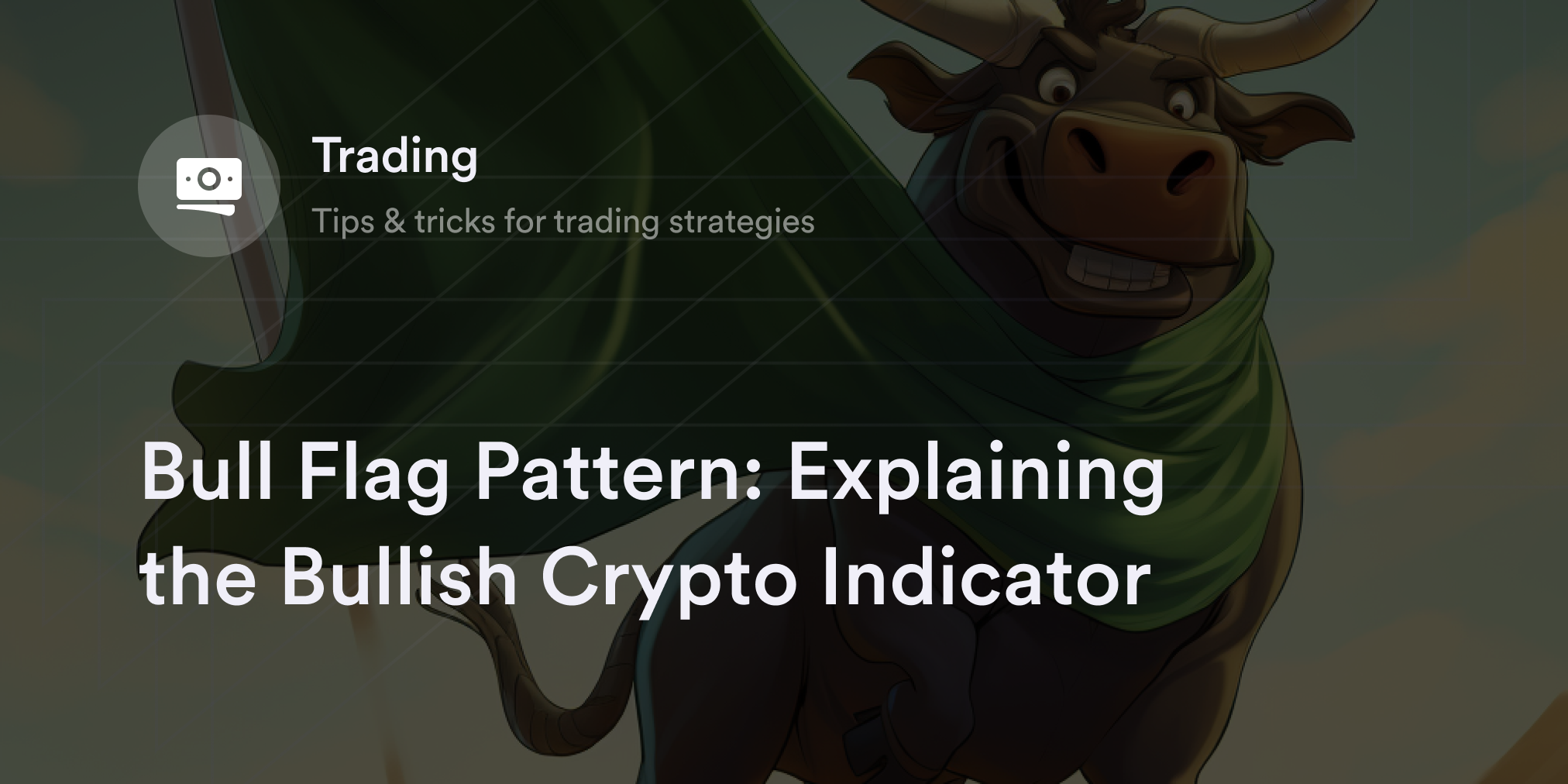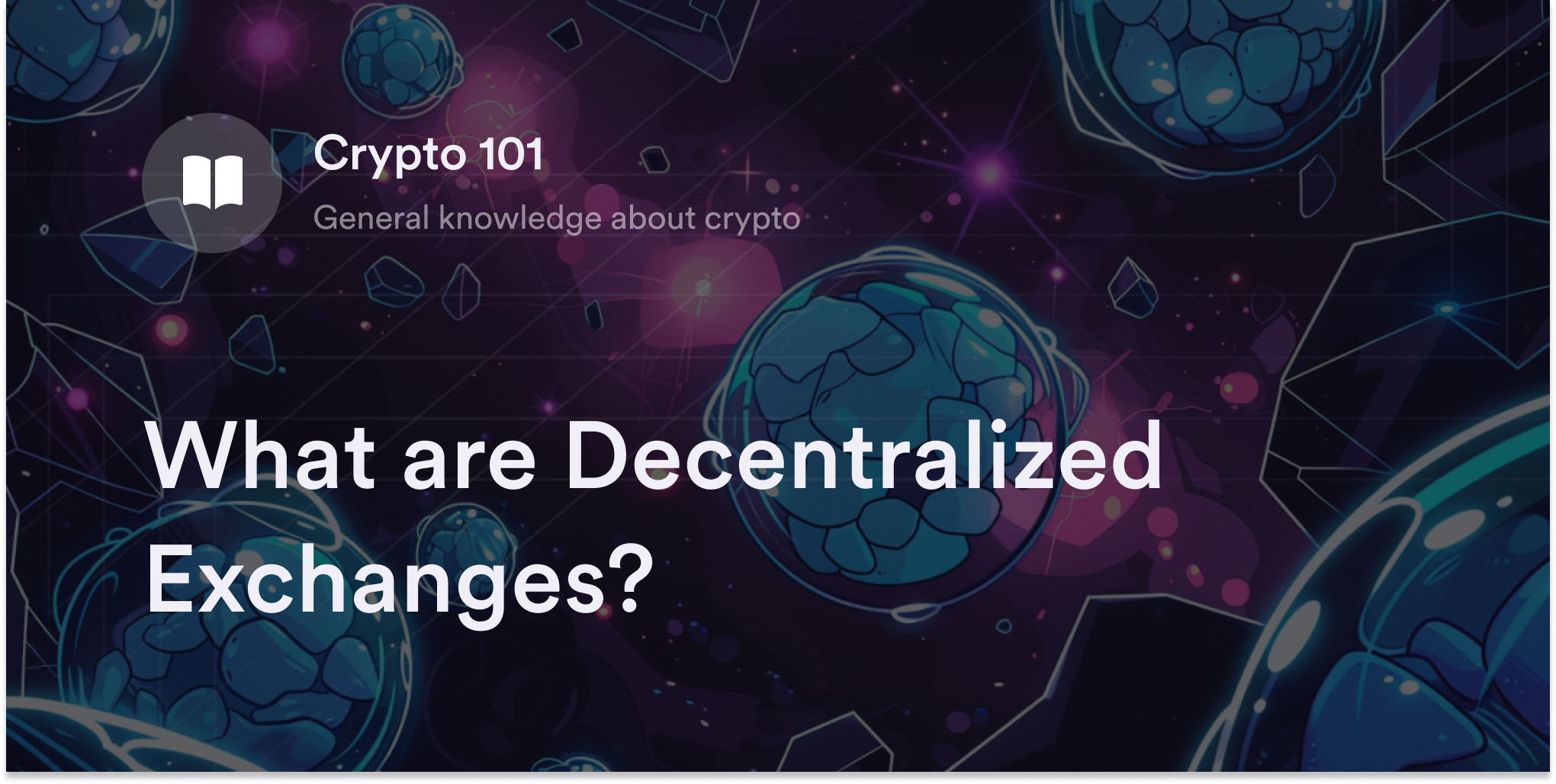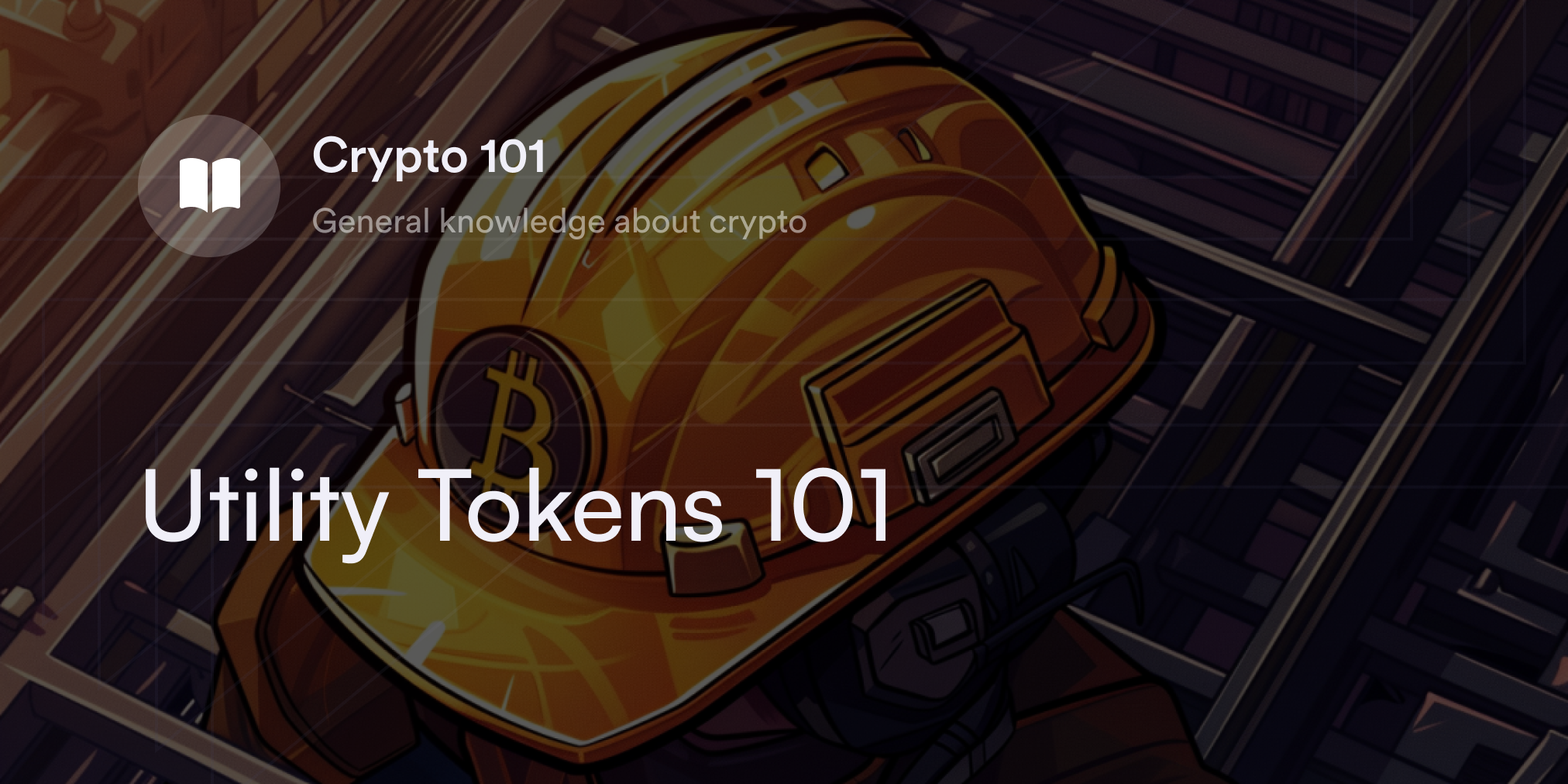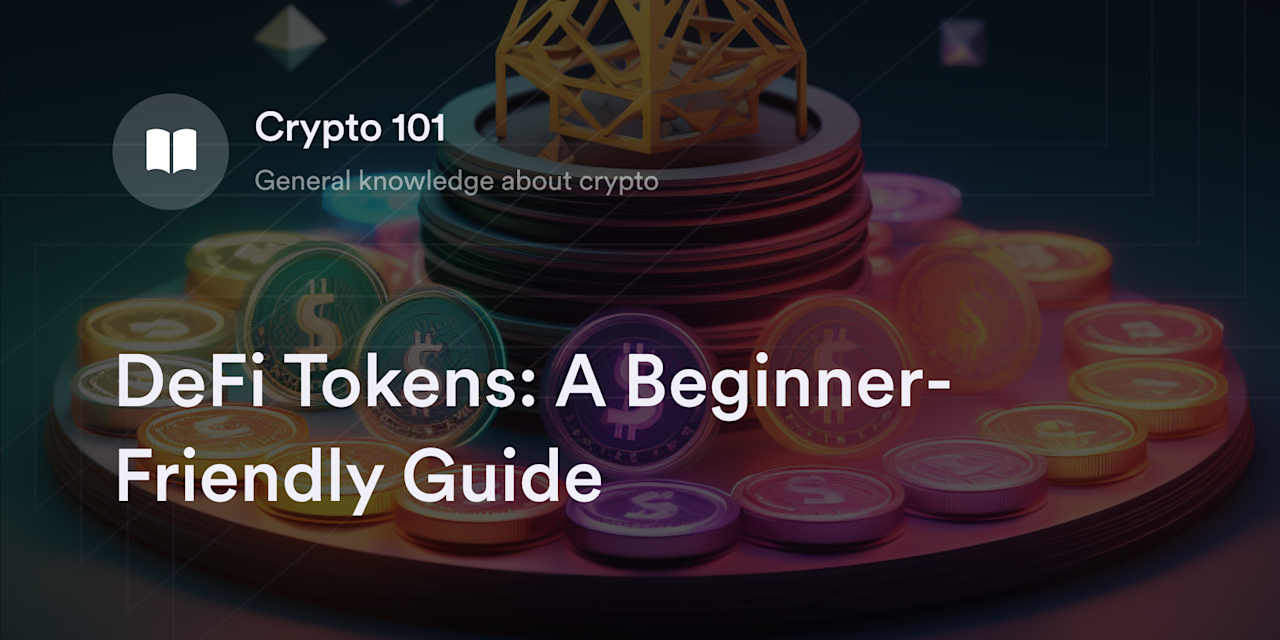
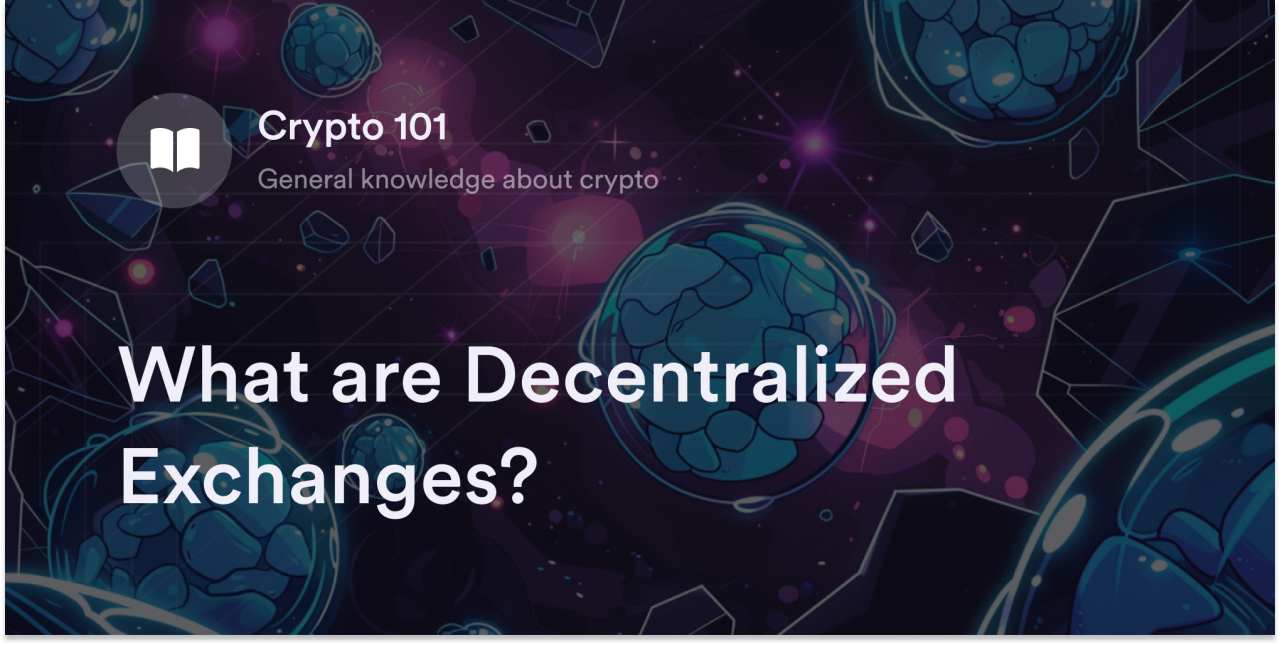

Decentralized exchanges (DEXs) have increasingly become hubs for crypto trading. Although centralized crypto exchanges (CEXs) like Coinbase still command a presence with billions in annual trading volume, growth across a few segments of the crypto economy is as fast as DEXs. Over 2020–2021, DEX users soared from 90,000 to 4.28 million, and the average monthly volume growth on DEXs was 15% higher than CEXs. As the trend toward decentralized trading continues to rise, DEXs uniquely cater to the demands of today’s crypto traders.
Since DEX activity has surged in the past few years, more crypto traders want to know what DEXs are and how they differ from CEXs. From automated market makers to on- and off-chain orderbooks, understanding all the essential details on DEXs is key to exploring these protocols like a pro.
First, let’s start with the basics:
What is a DEX?
DEXs are peer-to-peer (P2P) software protocols on decentralized computer networks called "blockchains" and allow traders to swap cryptocurrencies. People using a DEX connect their private self-custodial crypto wallet to the exchange to trade, so no third-party intermediaries approve transactions. For context, self-custodial crypto wallets give users access to an essential password called the private key, granting users control over their digital assets. Since the transactions on DEXs are P2P, traders always have custody over the cryptocurrencies they swap. DEXs, unlike their centralized counterparts, don't ask for personal data such as a phone number, proof of residence, or email address to start trading virtual coins or tokens. If users have a compatible crypto wallet with virtual funds, they can start trading the available cryptocurrencies on a DEX.
How do Decentralized Crypto Exchanges Work?
Each DEX uses unique procedures and algorithms to make P2P trading possible, but most rely on blockchain-based programs called smart contracts––which execute software commands without an intermediary. However developers code smart contracts, these programs fulfill their pre-programmed tasks when the conditions are right. For example, if you want to trade Ethereum (ETH) for Chainlink (LINK) on a DEX, the protocol's smart contract automatically recognizes this swap and sends LINK to your associated crypto wallet once you deposit ETH. The determinism and decentralization of smart contracts allow DEXs to operate without central authorities.
Although smart contracts are a fundamental aspect of most DEXs, developers have a few options for designing the software infrastructure for their protocols. Currently, three major types of decentralized crypto exchanges exist in the decentralized finance (DeFi) ecosystem:
Orderbook DEXs: These are lists of the current buy and sell prices from active traders for pairs of cryptocurrencies on an exchange. Buy and sell prices are called bid and ask prices in the virtual currency universe. While bid prices are the highest prices people are willing to buy a cryptocurrency, ask prices are the lowest holders want to sell their digital assets. DEXs using the orderbook model record buy and sell orders to match traders at their preferred prices. These exchanges either store orderbook data directly on the blockchain (aka on-chain) or in an off-chain database, such as cloud storage, before finalizing transactions on-chain.
Automated market makers (AMMs): AMMs use a combination of algorithms and programs called liquidity pools (LPs) to facilitate P2P crypto swaps. An LP is a smart contract holding cryptocurrency deposits from users (aka liquidity providers), which traders use to swap between crypto pairs. AMM DEXs incentivize people to lock cryptocurrencies in their LPs by offering a percentage of the total trading fees. To ensure these LPs’ balance remains stable as traders buy and sell digital assets, AMMs use algorithms to automatically adjust the token distribution and cryptocurrency’s market price.
DEX aggregators: DEX aggregators like 1Inch collect data feeds from DeFi protocols and CEXs to help traders find the most attractive market prices for digital assets. Typically, they use advanced algorithms to provide a search engine-like experience in DeFi. Traders using DEX aggregators often analyze various routing options in the crypto ecosystem as they search for the best deal for their target trading pair.
Centralized Versus Decentralized Crypto Exchanges
The primary difference between CEXs and DEXs is that the former uses centralized intermediaries and orderbooks to match buyers and sellers. The company running a CEX (e.g., Coinbase or Gemini,) is the liaison verifying trades between the platform's users.
Second, CEXs use custodial wallets to store each user's digital assets rather than letting users swap cryptocurrencies with self-custodial wallets. With a custodial wallet, only the CEX knows the private keys, meaning users who buy crypto with a CEX account only have partial ownership over their crypto assets. It's only after traders send crypto from a CEX to a self-custodial wallet (like MetaMask or Trezor) that they can control their coins and tokens.
Another significant distinction is that CEXs often ask for personal info from account holders called know-your-customer (KYC) data. Typically, someone interested in using a CEX needs to send their home address, email, and a copy of their driver's license (or any other government-issued ID) to start trading cryptocurrency. In contrast, traders using DEXs only need to link their decentralized wallet to the exchange to start trading.
A List of Popular Decentralized Exchanges
From dYdX and DODO to Curve and QuickSwap, crypto traders have plenty of DEXs to choose from in DeFi. And for those new to exploring DEXs, visit crypto price aggregator websites like CoinMarketCap and review the most popular DEXs under the "Exchanges" tab. Here are a few:
dYdX: Launched on Ethereum in 2017, dYdX is a leading DEX focused on offering eligible traders low-fee crypto perpetuals trading. Thanks to dYdX's unique on- and off-chain orderbook model, eligible crypto traders enjoy deep crypto liquidity for fast and efficient trades with minimal slippage. dYdX is currently working on a v4 upgrade in the Cosmos ecosystem to provide eligible derivatives traders with even lower fees, faster confirmation speeds, an end-to-end decentralized experience, and greater flexibility when setting up trades. For more details on v4, read the latest news on dYdX's official blog.
Uniswap: Launched on Ethereum in 2018, Uniswap was the first AMM DEX and remains one of the most actively used DEXs in DeFi. Sometimes, trading activity is so high on Uniswap that it outpaces the daily volume for CEXs like Coinbase. In addition to Ethereum, Uniswap offers decentralized trading services on Ethereum-compatible blockchains like Polygon, Arbitrum, and Optimism.
Curve Finance: Like Uniswap, Curve Finance is an AMM DEX on Ethereum that lets traders swap between digital assets using an Ethereum-based crypto wallet. The primary feature that separates Curve Finance from other AMM DEXs is its focus on low-volatility trading pairs, especially stablecoins and wrapped tokens. By offering trading pairs for cryptocurrencies with almost identical values, Curve reduces the risk traders pay more or less than the quoted price when closing a trade. It now works on multiple Ethereum-compatible blockchains, including Polygon, Arbitrum, and Avalanche.
Sushi: Formerly called SushiSwap, Sushi is a copy of the Uniswap DEX on the Ethereum blockchain. Elusive developers 0xMaki and Chef Nomi introduced Sushi in 2020 and attracted hundreds of Uniswap liquidity providers by offering high rewards paid in the protocol's SUSHI governance token. Sushi's signature product is its AMM DEX, but it also provides DeFi services such as a launchpad for new crypto projects and staking rewards for SUSHI holders.
1Inch: 1Inch is a DEX aggregator first introduced at a 2019 hackathon event in New York. Developers Sergej Kunz and Anton Bukov released the 1Inch protocol on Ethereum in 2020 and continue to expand the DEX's aggregation sources to help traders find attractive prices in DeFi. Today, 1Inch connects with dozens of DEXs on blockchains (like Ethereum, Arbitrum, and Polygon) and uses its Pathfinder algorithm to scan for the best available rates.
Experience Low-Fee Decentralized Trading on dYdX
dYdX currently uses a hybrid on- and off-chain orderbook model to provide eligible traders with a fast, convenient, and low-fee decentralized trading experience. After linking a compatible crypto wallet to dYdX's platform, eligible traders can access dozens of crypto perpetual contracts, slippage tolerance tools, and up to 20x leverage.
For more information on how trading crypto perpetuals differs from buying digital assets on spot exchanges, check out the crypto educational resources on dYdX Academy and eligible traders can start trading on dYdX today.
Disclaimer
The content of this article (the “Article”) is provided for general informational purposes only. Reference to any specific strategy, technique, product, service, or entity does not constitute an endorsement or recommendation by dYdX Trading Inc., or any affiliate, agent, or representative thereof (“dYdX”). Use of strategies, techniques, products or services referenced in this Article may involve material risks, including the risk of financial losses arising from the volatility, operational loss, or nonconsensual liquidation of digital assets. The content of this Article does not constitute, and should not be considered, construed, or relied upon as, financial advice, legal advice, tax advice, investment advice, or advice of any other nature; and the content of this Article is not an offer, solicitation or call to action to make any investment, or purchase any crypto asset, of any kind. dYdX makes no representation, assurance or guarantee as to the accuracy, completeness, timeliness, suitability, or validity of any information in this Article or any third-party website that may be linked to it. You are solely responsible for conducting independent research, performing due diligence, and/or seeking advice from a professional advisor prior to taking any financial, tax, legal, or investment action.
You may only use the dYdX Services in compliance with the dYdX Terms of Use available here, including the geographic restrictions therein.
Any applicable sponsorship in connection with this Article will be disclosed, and any reference to a sponsor in this Article is for disclosure purposes, or informational in nature, and in any event is not a call to action to make an investment, acquire a service or product, or purchase crypto assets. This Article does not offer the purchase or sale of any financial instruments or related services.
By accessing this Article and taking any action in connection with the information contained in this Article, you agree that dYdX is not responsible, directly or indirectly, for any errors, omissions, or delays related to this Article, or any damage, injury, or loss incurred in connection with use of or reliance on the content of this Article, including any specific strategy, technique, product, service, or entity that may be referenced in the Article.

